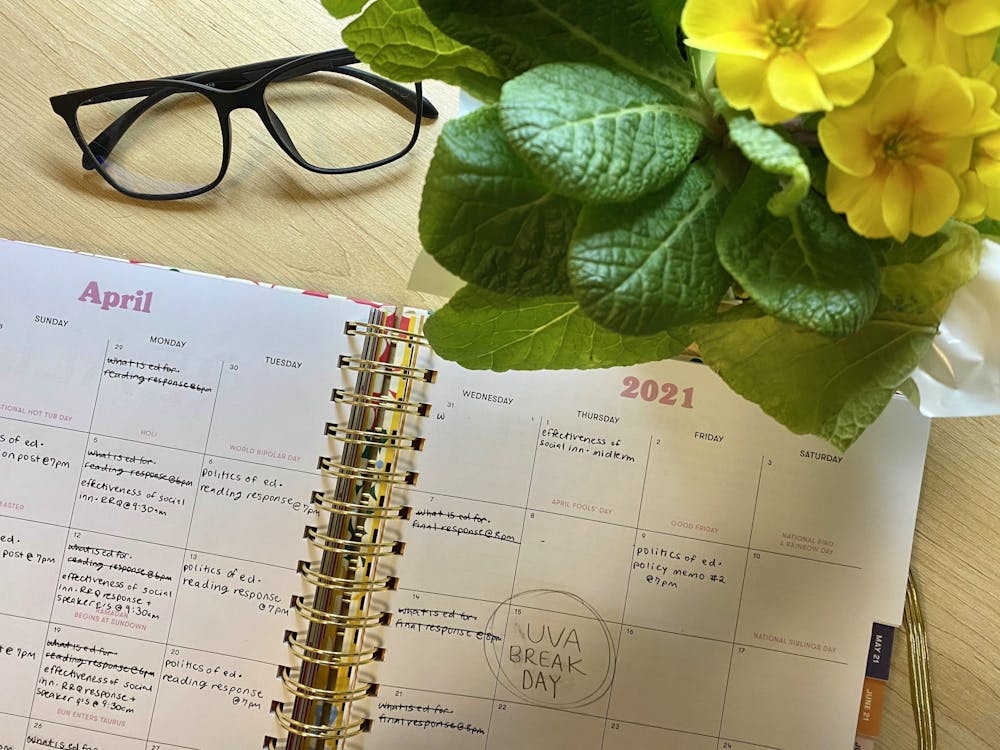This semester is sure to be rife with COVID-19 related stressors and pressures. Respect for our own health and the health of others mandates strict adherence to University COVID-19 guidelines. The limitations from the fall semester still exist — students must expect that they will miss out on experiences that they or other University students have enjoyed in past years. In light of the social oriented sacrifices students are making, professors should be empathetic toward student stress levels. Despite less formal breaks, professors must understand that students still need time to relax. One such opportunity that will require support from students and professors is the newly changed spring break schedule.
Generally, spring break at the University is a weeklong reprieve from classes — this year’s spring break, however, looks quite different. The typical week-long break has been replaced with multiple shorter break days. Despite the complications of this alteration, changing the structure of the traditional spring break was the safe decision. The University has a duty to reasonably restrict events that have the potential to increase the spread of COVID-19. While the University has done its part, students and professors still have a responsibility to respect the intentions of the spring break change. Students must avoid activities that would potentially spread COVID-19, and professors should organize their courses in a manner that genuinely allows students to have a break on these days.
There are justifiable reasons for students to be dismayed at this scheduling change. Although the decision was clearly intended to help slow the spread of COVID-19, there are several unfortunate implications. The pandemic has resulted in increased stress for many students. However, the stress relief that comes from a weeklong break cannot compare to the relief associated with a day-long break. Students are clearly more stressed than in previous years with the numerous challenges presented by learning during a pandemic, yet they are provided less opportunities for much-needed rest. Regardless of this year’s gathering limitations, the unfortunate schedule change will be in vain if students disregard the pandemic and spread COVID-19 while attempting to enjoy a more traditional spring break.
Before the pandemic, spring break was generally associated with travel and spending time with friends and family. With the new schedule, one of the new spring break days creates a three-day weekend. As such, I am particularly worried about students attempting activities on this weekend that were permissible in prior years — attending large gatherings or weekend long trips, for example. Although students should use their rest days to spend time with friends, they have a responsibility to not behave recklessly. Remember to follow the gathering size and travel expectations. The current gathering guidelines prohibit groups larger than six students and expect that all students remain at least six feet apart. In addition, students must understand that traveling in and of itself is a threat to the health of the University community. Unnecessary traveling during the pandemic is reckless. Last year, traveling during spring break led to spikes of COVID-19 on many college campuses. While we all want the pandemic to be over, ignoring COVID-19 will only exacerbate its consequences. Do not needlessly put the University and Charlottesville community at risk.
On the other hand, professors must let this break remain a true break for students. In its essence, the reprise of spring break is intended to be a time for students to destress and relax with family and friends — the modified schedule should not change this goal. Especially with asynchronous classes, I worry that professors will continue to assign work during this period. I am also concerned that professors may schedule additional assignments during weeks where students have a break day, with the belief that students pick up the slack during their time off. While many students seem to agree that they would prefer a week long-break, even one day of rest can be beneficial. Professors must not take advantage of the altered schedule to assign additional work.
I, along with many others, am personally disappointed that we will not be able to enjoy a weeklong spring break. However, I respect the decision of the University administration. They placed our best interests at the heart of this decision — valuing the mental and physical health of students. Nevertheless, sacrificing our week-long break is futile if students refuse to follow the clear expectations of the schedule change. However, any number of break days is worthless if professors refuse to acknowledge the very purpose for these days — to provide students a deserved rest from coursework stress. Reducing the risk of COVID-19 spreading while upholding spring break’s aim to destress is only possible if all of us work together.
Jessica Moore is an Opinion Columnist for The Cavalier Daily. She can be reached at opinion@cavalierdaily.com.
The opinions expressed in this column are not necessarily those of The Cavalier Daily. Columns represent the views of the authors alone.





